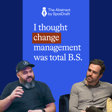
Ep 104: Jack of All Trades, Master of Risk: How Joon Park Navigates Modern Legal Work
In this episode of The Abstract, host Tyler Finn is joined by Joon Park, Chief Legal Officer at Extend Enterprises, Inc., for a candid conversation about building a legal career defined by integrity, adaptability, and curiosity.
From navigating the collapse of Refco early in his career to leading legal at high-growth fintech companies, Joon shares how high-pressure moments shaped his risk mindset and leadership style. He unpacks why startups need legal guidance from day one, how to embed compliance without slowing down, and why modern legal counsel must be both partner and protector. Along the way, Joon reflects on finding purpose, embracing uncertainty, and staying curious through every chapter.
Read detailed summary: https://www.spotdraft.com/podcast/episode-104
Topics
Introduction - 00:00
Early career influences: philosophy, parenting, and curiosity - 01:54
Holistic thinking and law as systems navigation – 05:00
Transitioning from Big Law to in-house for financial security – 07:01
Refco collapse: a crash course in legal ethics and resilience – 10:35
Risk mindset: documenting decisions and staying aligned – 14:05
Generalist vs. specialist: finding fit during the Citigroup bailout – 17:02
Moving to startups: autonomy, prioritisation, and risk ownership – 21:59
Legal as an enabler, not a blocker, in startup environments – 24:35
Building scalable compliance without killing speed – 26:17
Legal’s role in shaping company culture and accountability – 28:21
Following curiosity to stay motivated and engaged – 30:19
Rapid-fire Questions – 32:21
Connect with us:
Joon Park - https://www.linkedin.com/in/joon-park-147a9a92/
Tyler Finn - https://www.linkedin.com/in/tylerhfinn
SpotDraft - https://www.linkedin.com/company/spotdraft
SpotDraft is a leading contract lifecycle management platform that solves your end-to-end contract management issues. Visit https://www.spotdraft.com to learn more.



















